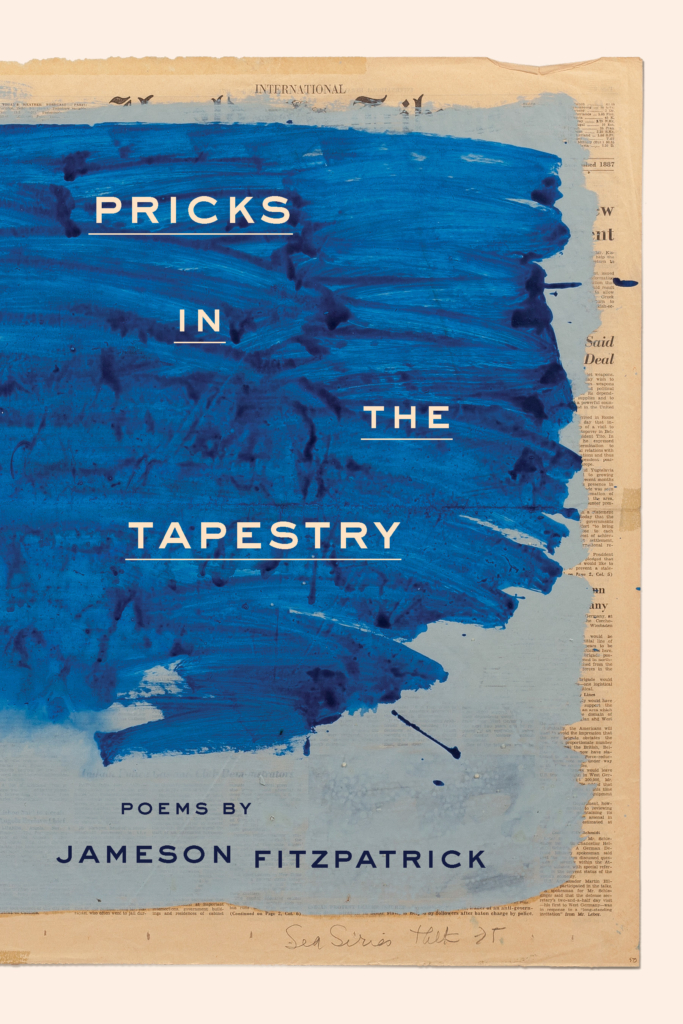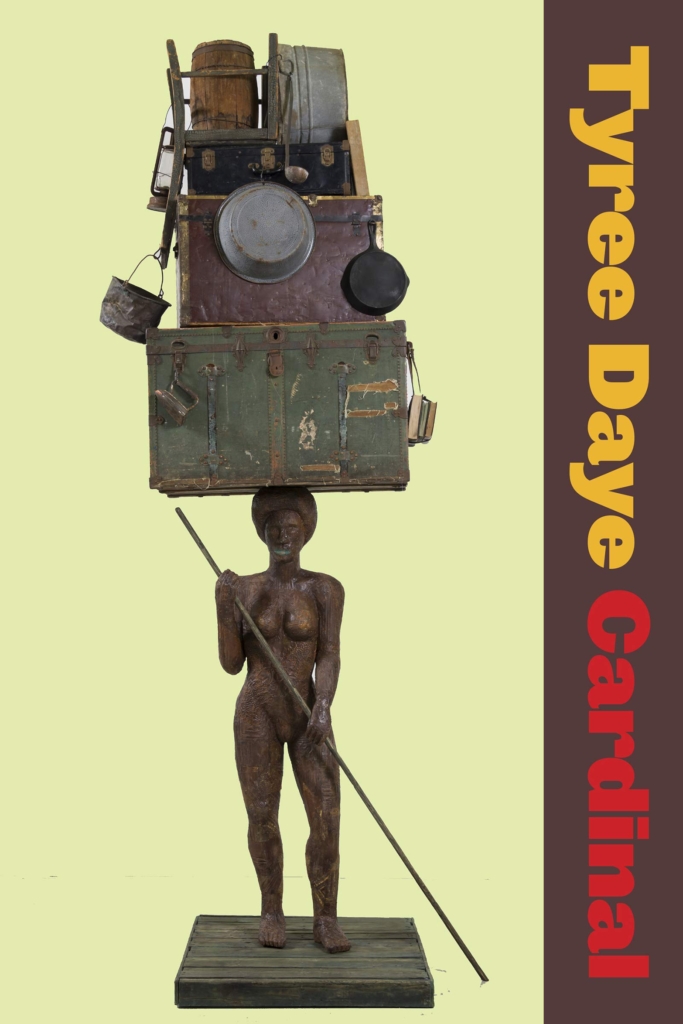
Pricks in the Tapestry by Jameson Fitzpatrick
The thread that ties together Jameson Fitzpatrick’s writings in Pricks in the Tapestry is not linear; there is neither chronology nor anachronism, development nor necessary trajectory. Stanza to stanza, page to page, poem to poem, speaker to speaker: the speakers don’t strive to be unified or explained. Forming a carefully tangled web, the the collection constitutes various selves submerged in a confusing world of sex, gender, race, class, family, and history. The force that moves the reader across the web from locus to locus, allowing disparate ideas and feelings to connect to one another, is nothing other than the desire to unify, explain, and pathologize. Such pursuits will find no fulfilling satisfaction here.
Fitzpatrick renders the networks (and lack thereof) between social norms, subjectivity, politics, and sexual desire as an ambivalence-inducing labyrinth. Each poem centers itself on one of these vertices, from politicizing shower water in one line to grammatical gender in the next—to describing how norms and expectations can produce a dispossession of mind and body, framing sexual encounters with an impotency in being able to distinguish between being “plucked like a flower / versus / plucked like a string.”
Be warned that Fitzpatrick’s poetry is seldomly flamboyant or glamorous. Nor are these poems oriented towards any sort of revealing shock value. Instead, Fitzpatrick’s speakers tend to focus on the specific, mundane moments of a gay man’s coming-of-age. The result is a collection of poetry that promotes active pursuit toward an awareness of the vexing inconsistencies and displacements of a queer person’s life. Unveiling these complexities, Fitzpatrick coalesces monotonous social commentary, intimate sexual encounters, and ekphrases of ordinary details to confront the reader with an arousing imperative: “You have to choose what to feel bad about.”
-Sam Hyman

Mad at the World: A Life of John Steinbeck by William Souder
A tough act to follow after his glowingly received biographies of Rachel Carson (author of Silent Spring) and of John James Audubon (18th-/19th-century American naturalist), William Souder takes on “America’s most pissed-off writer” in his generous, thoroughly considered account of John Steinbeck. A West Coast heart in the midst of an East Coast literary milieu, an author whose work is as widely read in American schools as it is swiftly dismissed by modern readers for its largely machismo portrait of Depression-era America, Steinbeck was as mad at the world in his daily life as he was in love with its persons in his books. Souder’s portrait sets Steinbeck off from the Lost Generation’s trim europhilia and the Beats’ mad ecstasy, chronicling someone who “could not bear” to see “another human being oppressed, abused, or taken advantage of by anyone more powerful, especially if the motive was greed.” Steinbeck, for all his artistic and personal shortcomings, was an authorial breed of his own, and Souder reminds us of the timeless importance of his sustained commitment to the everyman and the everywoman in everything he wrote.
That said, Souder doesn’t hesitate to show the persistent conflicts—signs of humanity, maybe—that Steinbeck’s work inscribed in his personal life. Known as a staunch moralizer in even his best books, Steinbeck was boundlessly critical of his loved ones, but ghosted anyone who offered a word of honest critique on his own work. He wrote a tome’s worth of prose on the merits, strength, and virtues of the working class, but sent his son Thom to an East Coast boarding school, explaining “that he had known many men who got through life without an education, doing manual labor. This was an honest but boring and exhausting way to live, and he recommended against it.” Steinbeck, Souder writes, “believed he understood the life of the common man all too well and he didn’t want it for his sons.” And the masculine superiority that pokes through every novel pops up in his journal entries and letters, in which he devotes as many words to his virility and promiscuity as he does to his beloved Upper East Side garden terrace.
I attended the National Steinbeck Center’s online Webinar with Souder a couple weeks ago, and I was hardly surprised when he confessed to spending months in the Salinas archive jotting down countless details from every tape and scrap available. Mad at the World is a deep dive into the life of a key, if imperfect, figure of American letters, ensuring above all that Steinbeck’s truth goes marching on.
-Ryan Daar

Cardinal by Tyree Daye
Tyree Daye’s Cardinal travels high and above many planes. From a bird’s eye view, this poetry collection covers a lot of ground. The reader is guided through the birth and bones of a North Carolina field, the untenable paths of the ocean and Harlem, and the directionless space that is grief and the stars.
Described as a “poetic ‘Green Book,’” Cardinal is fixated with destination, the terminal end of a journey, much more than the act of traveling. For the poet, movement and march—be it physical or otherwise—are not freeing in themselves. Daye isn’t concerned with conventional wisdom when he writes, “freedom/ was not the act of flying,” and that “the North star is irrelevant.” Only certain truths are made clear in the text: time is ever moving, death marches forward, and Black life can take on liminality and generational grief seemingly unending. Despite this, familial joy and the warmth of home remain central to the work’s pathos, on full display in poems like “Oceans on Either Side of Me” and “The World Grows.” Throughout the collection are full-colored photographs, presumably of the poet’s family, vintage and smiling.
Daye is clearly comfortable in his union between style and form, recasting and reformatting a few older works in ways that warrant attention. There are odes to sex, cities, and small towns. Each poem unravels differently but remains tethered to the land and lives Daye intimately knew. The appearance of cardinals, vultures, and other birds is expected given the poet’s meditations on flight, but their mention never reaches a point of saturation or gimmick. Truth told, there’s some genius in Cardinal.
-Malachi Jones
